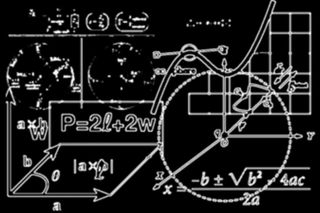
Low Math Confidence May Mean Poorer Health, Less Income
The ability to weigh life’s odds effectively takes a lot more than testable skill.

Math skills give us an edge in life only as much as our confidence in them allows, suggest two new studies from The Ohio State University. The finding may sound obvious, but less apparent are the real-life implications for participants with good math skills but who perceive themselves as bad at math: researchers found they faced more financial difficulties and poorer health than participants with good math skills and high confidence.
“If you have low numeric confidence, all the math skills in the world appear not to help much,” Ellen Peters, PhD, an author of the study during her time as a professor of psychology at The Ohio State University, said in a statement. Peters is now at the University of Oregon. “We think that those who lack confidence don’t persist with the numbers when the going gets tough or tedious. As a result, their skills aren’t used.”
In Peters’ and team’s studies, the effects were stark: Among participants who scored 100% on the math test administered by researchers, those with high confidence earned roughly US$ 94,000 more in annual income than those with low confidence — even though skills were objectively the same level of excellence between the two groups.
The team also studied the math skills, math confidence and health of lupus patients, as rated by their doctors. Lupus, a chronic disease, requires good math skills over the course of a lifetime to constantly weigh the probability of risks and benefits of different treatment options, track medication doses and timings (which may vary), and navigate health insurance. The study found the doctors of patients with high math skills and confidence reported better-managed lupus, while doctors of patients with high math skills and low confidence reported more negative effects of the condition.
The research, published in the U.S. journal Proceedings of the National Academy of Sciences, is not without red flags — not least of which is its reliance on self-reporting — of confidence, of financial outcomes — a notoriously biased method of data gathering. It’s also not clear whether the researchers took into account the many other factors that could influence differences in income levels and health outcomes, which means a correlation between math skills, confidence and real-life effects has been established by these studies, but not a lack of math confidence as the cause of less income or poorer health.
Related on The Swaddle:
Children’s Books Are Perpetuating Math and Science Gender Stereotypes
That said, the correlation does reveal potential complications for efforts aimed at equalizing the STEM gender gap. While efforts are afoot to increase the enrolment of female students in STEM subjects, stereotypes about what kinds of behavior (modesty, insecurity) and subjects (humanities and language) are more suitable to girls and women, versus those suitable to boys and men (confidence; science, technology, engineering and math) persist.
“Decades of research by Myra and David Sadker and Karen R. Zittleman in U.S. classrooms show teacher-student interactions tend to unconsciously reward boys in ways that challenge them to do more, and girls in ways that encourage them to be quiet,” The Swaddle reported in a 2018 examination of the difference between girl and boy students in the classroom. Combined with textbooks that reinforce gender stereotypes around skills, and sexist messaging in and outside of school, “By college age, boys are more likely than girls to be confident in their intellect. This, despite the fact that a study of 30 countries found girls have consistently outperformed boys across all school subjects for nearly a century.”
If lack of confidence in math skills really does contribute to such negative financial and health effects in real life, it’s clear who is most vulnerable — and it makes nuanced efforts to increase gender equality in STEM education all the more urgent.
Liesl Goecker is The Swaddle's managing editor.
Related


Consent Is More Than Just a Yes to Sex, It’s an Enthusiastic Yes
